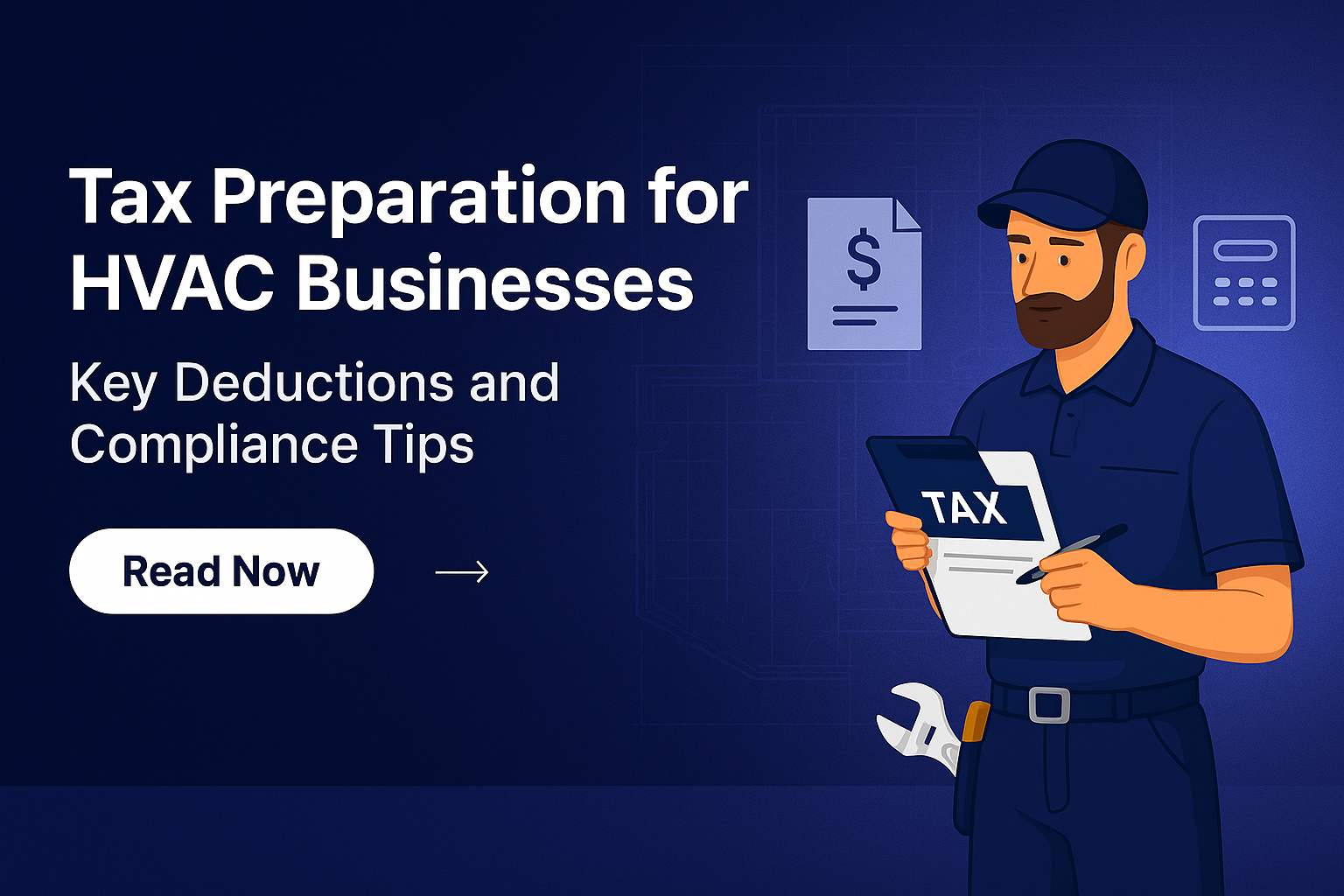
If you're running an HVAC business, you know that staying on top of equipment maintenance and customer service is non-negotiable. But when it comes to tax preparation? That often falls to the bottom of the to-do list, until it's too late.
Here’s the truth: tax season doesn’t have to be stressful. With proper preparation, HVAC businesses can lower their tax bills, stay compliant, and keep more money.
This practical, straightforward guide simplifies tax preparation specifically for HVAC businesses, whether you're a solo operator or managing a larger team.
HVAC companies face specific expenses like tools, trucks, job-site materials, fuel, subcontractors, and licenses. Without proper tracking, these deductible expenses often get missed.
Without a good system:
If you're still running your business from a personal bank account, now’s the time to stop.
Open a dedicated business checking account and credit card. All deductible expenses, gas, tools, job materials, advertising, should run through these accounts. Clear financial records simplify your tax preparation and keep the IRS satisfied.
Commonly missed HVAC tax deductions include:
✅ Vehicle Expenses
If you use a work truck or van, you can either:
✅ Tools & Equipment
From pipe cutters to pressure gauges, tools under $2,500 can often be expensed immediately. Larger equipment may qualify for Section 179 or bonus depreciation.
✅ Job Materials
Refrigerants, coils, wires, ductwork, it’s all deductible when used for a client job.
✅ Software & Subscriptions
Think service scheduling apps, QuickBooks, estimating software, even paid HVAC forums or trade publications.
✅ Contract Labor
Did you hire a subcontractor for installs or seasonal help? If you paid them over $600, be sure to send a 1099-NEC and write off the cost.
✅ Home Office or Warehouse
If part of your home or garage is used exclusively for admin work, storage, or staging materials, you may qualify for the home office deduction.
If you’re still filing taxes as a sole proprietor, you may be paying more than you should.
Consider switching to an S-Corporation to reduce self-employment taxes.
HVAC businesses earning over $80K annually often benefit from significant tax savings through this structure. Regularly reviewing your business structure can help ensure tax efficiency and alignment with your long-term financial goals.
HVAC businesses have peak and off-peak seasons. Build tax preparation into your annual schedule:
Regular monthly or quarterly check-ins will smooth the tax prep process.
General accountants can help, but an expert familiar with HVAC businesses will:
Working with a CPA or tax advisor familiar with HVAC businesses can help ensure you're taking advantage of all relevant deductions and tax-saving strategies.
Paying yourself through owner draws, W2 salary (if you're an S-Corp), or a combination of both should be part of your tax planning. This impacts:
It’s not just about minimizing taxes, it’s about building financial stability.
Tax prep for HVAC businesses isn’t just about compliance, it’s a way to reclaim your time and protect your profit.
Here’s your HVAC Tax Prep Checklist:
✅ Separate personal and business expenses
✅ Track write-offs like tools, mileage, job materials
✅ Explore S-Corp or LLC structures
✅ Schedule tax reviews each season
✅ Work with a CPA who understands trades
✅ Pay yourself the right way
By getting proactive, you won’t just survive tax season, you’ll own it.
Want to clean up your numbers before tax season? Work with a specialist tax preparer experienced with HVAC businesses to help you identify and maximize the right tax deductions for your company.
You’ve got the jobs. You’ve got the team. Now get the financial clarity to grow with confidence.
We’ll show you where your money’s going — and help you keep more of it.
